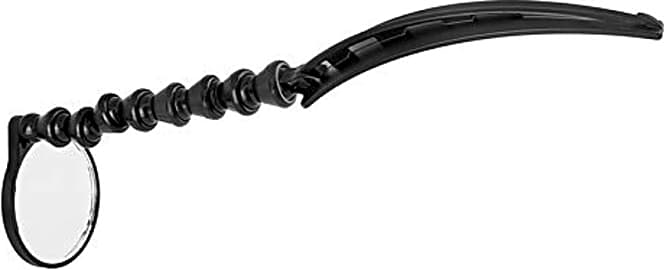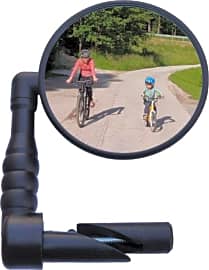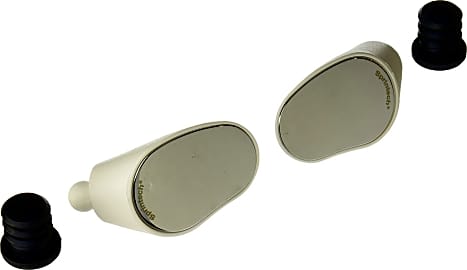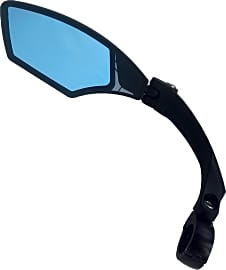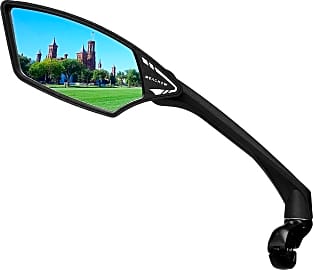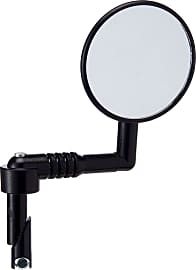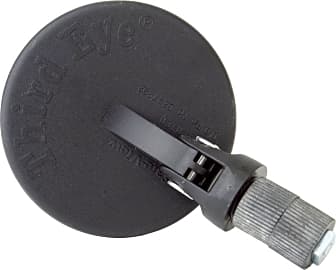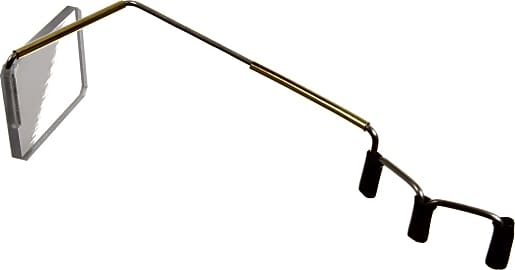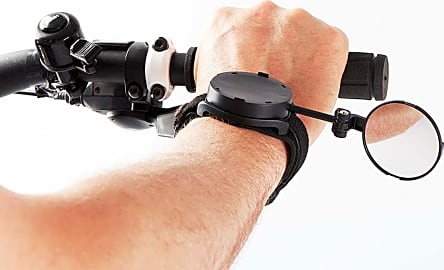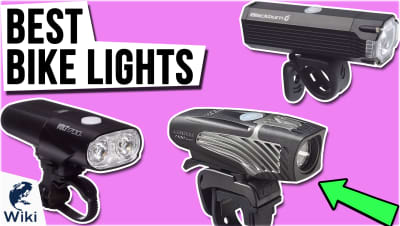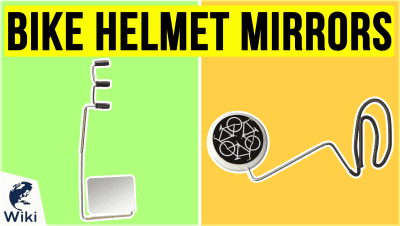The 10 Best Bike Mirrors

This wiki has been updated 38 times since it was first published in October of 2015. Cycling is an eco-friendly way to travel while getting exercise and fresh air. However, when you're out riding on busy streets, it's not wise to gamble that others will see you. Don't leave your safety to chance: ensure you have a great view of all the traffic around you with one of these bike mirrors. Our list includes options for all models, from road bikes to beach cruisers. When users buy our independently chosen editorial selections, we may earn commissions to help fund the Wiki.
Editor's Notes
August 05, 2020:
The Selle Italia Eyelink had no issues as a model, but I felt it was a little overpriced, and so I’ve replaced it with the very similar, but more reasonable Meachow Bar End. I’ve also removed the CatEye BM-500G and added the Xsafe Rearview, which has a convex mirror. This brings up an important consideration – are you going to choose a model with a convex or a flat mirror? Convex lenses give you a wider FOV, but in doing so, will naturally distort distances behind you, and this can throw some people off.
Options like the Hafny Bar End, Mirrycle MTB, Third Eye Handlebar and Xsafe Rearview are bar-end models which have a universal design that allows them to be placed on either handlebar and on both drop and flat bars, provided they fit; while the Hafny HD and Meachow are not, and you may be inclined to just to get a left-side mirror for countries like the US that use the right-hand lane driving system.
The Third Eye may be a bit tricky to install on straight handlebars depending on the size of your bar. The Sprintech Roadbikes is an interesting option in that it can be fit on either side, but it’s only suitable for drop bars, because of the angle of the mirror.
As one can see, the Bike Peddler Take A Look and Efficient Velo Tools Safe Zone are helmet-attachable mirrors, and the Myklops Rear View is a wrist worn mirror. All options are suitable, and though I feel that handle-mounted options are more convenient, some people may prefer helmet-attachable mirrors. Similarly, I believe that there are better mountable options out there to the Myklops Rear View for instance, but I’ve refrained from replacing it because I wanted this list to offer a variety of model types.
The Hafny Bar End still retains its spot on this list, and for good reason. While it offers only as many angles of motion as any other decent universal bar-end mirror, the mirror itself is quite impressive. It’s stainless-steel, which naturally affords a high level of durability, and it offers surprisingly good clarity and little distortion for a model that doesn’t use glass. The lens itself is slightly convex, but its not overly distorting, like many convex lenses are, and it comes in two diameters – 62mm and 68mm. By the way, Hafny does sell a very similar model that uses a glass lens, but I’ve opted not to include it here. Obviously, do ensure that any model you’re interested in will be able to fit your handlebar before you purchase it.
May 03, 2019:
After some deliberation, we have decided to remove the SmartView 300, as its durability over time is lacking. But when it comes to top picks, the Hafny Bar End and Efficient Velo Tools Safe Zone are still worthy options. The Hafny mounts to your handlebars, while the EVT is worn on your helmet; if you switch bikes often, the latter may be the more convenient choice. But keep in mind that not everyone can get used to these "dental mirrors." Hafny also offers an HD model that comes in a regular as well as an anti-glare option, which serves those who live in sunny, bright climates well. As to new additions, you may note the Myklops Rear View. Not every rider will like it, but there are many who swear by it. It slides onto your wrist or forearm, so you'll need to put it on and adjust it each time you ride, but you also won't risk it being easily stolen. It's on the more expensive side for its size, though, as is the Selle Italia Eyelink, so these may not necessarily be for casual riders.
Checking the Blind Spot: Bike Mirrors
Most bike mirrors use tension-controlled circular attachment hardware that can be affixed to the handle bars of almost any bicycle.
Riding a bicycle is one of the finest activities in which a person can engage. It is carbon-neutral and good for the environment, it provides both cardiovascular and skeletal muscle exercise, and it is enjoyable, too. And in cities plagued with heavy traffic, poor mass transit systems, or both, riding a bike can even be the most efficient way to commute about town. Riding a bike does mean subjecting oneself to a degree of risk, however: all it takes is one distracted driver, one unseen pothole, or one pedestrian heedlessly stepping into a bike lane to result in an accident.
The wise, experienced cyclist takes precautions to minimize the risks he or she faces every time they mount their bike. This includes wearing safety gear, paying attention to proper bicycle tuning and maintenance, and often it involves adding a few aftermarket accessories to a bike.
One of the best ways to stay safe on your bike is to increase your situational awareness ability by affixing a bike mirror to your cycle.
A bike mirror allows you to check the area immediately behind and to the side of your bike in a split second, helping you make safe lane changes and turns and keeping you aware of any potential threats encroaching on your space. While of course simply turning your head can also help to check behind you, doing so can take your attention off the road ahead just at the moment a danger rears before you. With a bike mirror, you can keep your eyes forward while inspecting the areas behind and to the side. Maintaining awareness of the roadway or path ahead is critical, especially when you are biking in a congested urban area or you are on an uneven path fraught with obstacles, such as those the mountain biker encounters.
Competitive racers too can benefit from a bike mirror; every split second counts in a serious bicycle race, and often the loss of rhythm caused by a backward glance can mean the difference between a victory and a second-place finish. A bicycle mirror can let you keep your eyes on the goal line while also keeping tabs on the competition.
Most bike mirrors use tension-controlled circular attachment hardware that can be affixed to the handle bars of almost any bicycle. Some can be slipped on the ends of straight handlebars, but might not work with the curved grips of a racing bike. When choosing a bike mirror, balance the benefits you'll get from a larger mirror -- e.g. a broader view -- against the added drag and larger profile a mirror can create.
Other Important Bike Safety Accessories
If there is one item every responsible cyclist must use, it is of course a helmet. Riding without a helmet is never a good idea under any circumstances, no matter how short your ride may be, no matter where you will be biking, and no matter how confident you are of your abilities. Never ride without a helmet; it's that simple.
Beyond the helmet, the next most important type of gear a bicyclist should use it is adequate lighting.
Beyond the helmet, the next most important type of gear a bicyclist should use it is adequate lighting. After dark, a biker is much more likely to be injured in an accident, as an improperly illuminated bike is simply hard to see, especially when lost among the headlights of busy city traffic. Reflectors are a good start, but actual bike lights are essential for safe riding at night or in rainy, foggy, or otherwise inclement conditions.
At the bare minimum, your bike should have a bright red light affixed to its back -- ideally with an option to flash rapidly -- and a white headlight-style lamp on the front that both helps you to see and makes you plainly visible to approaching motorists, cyclists, and pedestrians alike. Also consider using a headlamp, which will help to illuminate your path and which makes you that much more visible to others thanks to its elevated position. Illuminated vests are also a savvy choice for the cautious cyclist.
A bicycle horn or bell is also a good idea for the frequent cyclist; these devices can alert others to your presence and are especially useful as you approach pedestrians or bikers from behind. Horns and/or bells enhance rider and passerby safety during the daylight hours when a light is rendered useless by sunshine.
Finally, don't overlook the importance of your own clothing when you are riding a bike. Dedicated cyclists don't wear tight, form-fitting clothing because they think it is stylish, but rather because it minimizes wind resistance and makes your ride more efficient; it reduces the risk of a garment being snagged on gears, pedals, or other hardware; and it helps protect you against cuts and scratches should you fall off your bike during an accident.
Why Bike Safety Is Serious Stuff: Annual Accident Statistics
In the year 2015, nearly 820 bicyclists were killed in accidents that occurred on American roadways. The year before that saw approximately 725 such deaths. There is a slow trend developing that, while sobering, is not surprising: more people are riding their bikes, and as a result, more cyclists are being injured or killed each year.
About a quarter of those involved in deadly bike accidents had been consuming alcohol before commencing their ride.
While fewer than 1,000 annual bicyclist deaths may seem low given the growing prevalence of bikers on American roadways, that figure is offset by another statistic: in 2015, some 45,000 bikers were injured in traffic, and many of them in catastrophic ways.
The largest portion bike accidents occur in the hours between six and nine PM, pointing to the busy evening commute being an especially unsafe time for riding one's bike. About a quarter of those involved in deadly bike accidents had been consuming alcohol before commencing their ride.
One interesting point to note is that nearly 90% of bicycle fatalities in a given year are males. More men ride bikes than women, but the staggering gender disparity in accidents also points to male riders taking a more cavalier and risky approach to their bike riding habits.
When conducted with common sense, proper safety gear, and a cautious mindset, riding one's bike is largely safe and indeed is an eco-friendly and healthy undertaking. The sensible rider simply goes forth with the knowledge of what areas, times, and practices are the least safe, and adjusts his or her behavior accordingly.


